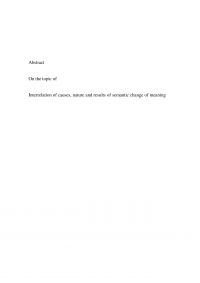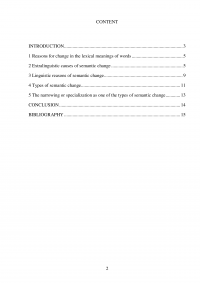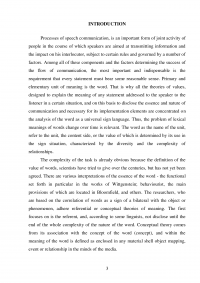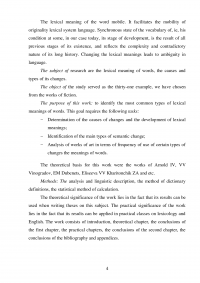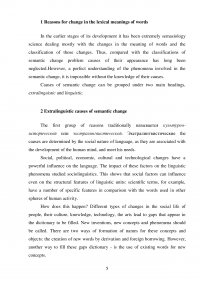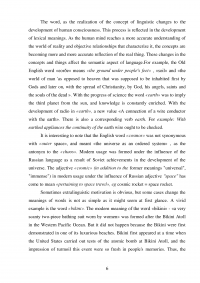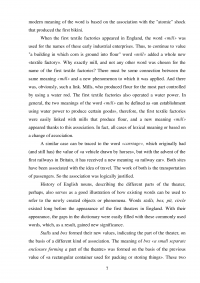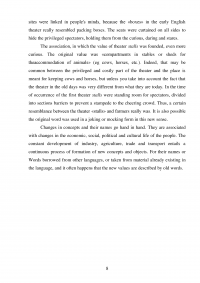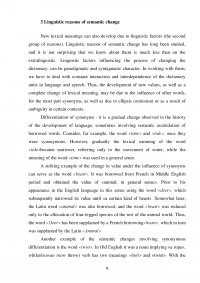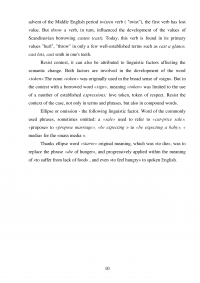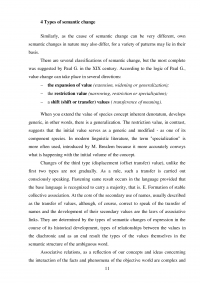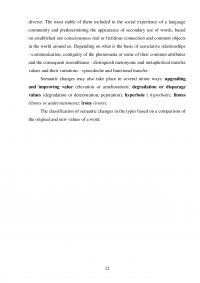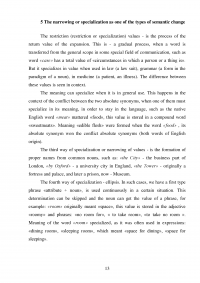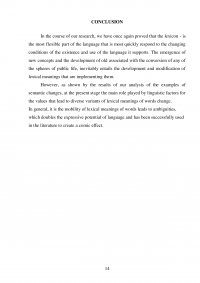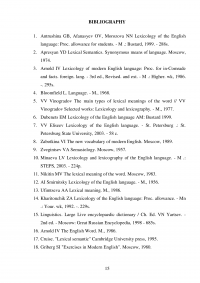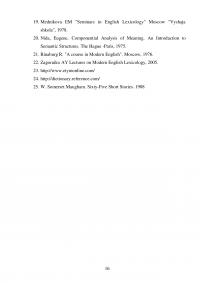Interrelation of causes, nature and results of semantic change of meaning
| Код | 235123 | ||
| Дата создания | 2018 | ||
| Страниц | 16 ( 14 шрифт, полуторный интервал ) | ||
| Источников | 25 | ||
|
Файлы
|
|||
|
Без ожидания: файлы доступны для скачивания сразу после оплаты.
Ручная проверка: файлы открываются и полностью соответствуют описанию. Документ оформлен в соответствии с требованиями ГОСТ.
|
|||
Образцы страниц развернуть (16)
Содержание
Введение
Processes of speech communication, is an important form of joint activity of people in the course of which speakers are aimed at transmitting information and the impact on his interlocutor, subject to certain rules and governed by a number of factors. Among all of these components and the factors determining the success of the flow of communication, the most important and indispensable is the requirement that every statement must bear some reasonable sense. Primary and elementary unit of meaning is the word. That is why all the theories of values, designed to explain the meaning of any statement addressed to the speaker to the listener in a certain situation, and on this basis to disclose the essence and nature of communication and necessary for its implementation elements are concentrated on the analysis of the word as a universal sign language. Thus, the problem of lexical meanings of words change over time is relevant. The word as the name of the unit, refer to the unit, the content side, or the value of which is determined by its use in the sign situation, characterized by the diversity and the complexity of relationships.
The complexity of the task is already obvious because the definition of the value of words, scientists have tried to give over the centuries, but has not yet been agreed. There are various interpretations of the essence of the word - the functional set forth in particular in the works of Wittgenstein; behaviourist, the main provisions of which are located in Bloomfield, and others. The researchers, who are based on the correlation of words as a sign of a bilateral with the object or phenomenon, adhere referential or conceptual theories of meaning. The first focuses on is the referent, and, according to some linguists, not disclose until the end of the whole complexity of the nature of the word. Conceptual theory comes from its association with the concept of the word (concept), and within the meaning of the word is defined as enclosed in any material shell object mapping, event or relationship in the minds of the media.
The lexical meaning of the word mobile. It facilitates the mobility of originality lexical system language. Synchronous state of the vocabulary of, ie, his condition at some, in our case today, its stage of development, is the result of all previous stages of its existence, and reflects the complexity and contradictory nature of its long history. Changing the lexical meanings leads to ambiguity in language.
The subject of research are the lexical meaning of words, the causes and types of its changes.
The object of the study served as the thirty-one example, we have chosen from the works of fiction.
The purpose of this work: to identify the most common types of lexical meanings of words. This goal requires the following tasks:
- Determination of the causes of changes and the development of lexical meanings;
- Identification of the main types of semantic change;
- Analysis of works of art in terms of frequency of use of certain types of changes the meanings of words.
The theoretical basis for this work were the works of Arnold IV, VV Vinogradov, EM Dubenets, Eliseeva VV Kharitonchik ZA and etc.
Methods: The analysis and linguistic description, the method of dictionary definitions, the statistical method of calculation.
The theoretical significance of the work lies in the fact that its results can be used when writing theses on this subject. The practical significance of the work lies in the fact that its results can be applied in practical classes on lexicology and English. The work consists of introduction, theoretical chapter, the conclusions of the first chapter, the practical chapters, the conclusions of the second chapter, the conclusions of the bibliography and appendices.
Фрагмент работы для ознакомления
1 Reasons for change in the lexical meanings of words
In the earlier stages of its development it has been extremely semasiology science dealing mostly with the changes in the meaning of words and the classification of those changes. Thus, compared with the classifications of semantic change problem causes of their appearance has long been neglected.However, a perfect understanding of the phenomena involved in the semantic change, it is impossible without the knowledge of their causes.
Causes of semantic change can be grouped under two main headings, extralinguistic and linguistic.
...
2 Extralinguistic causes of semantic change
The first group of reasons traditionally называется культурно-исторической или экстралингвистической. Экстралингвистические the causes are determined by the social nature of language, as they are associated with the development of the human mind, and meet his needs.
Social, political, economic, cultural and technological changes have a powerful influence on the language. The impact of these factors on the linguistic phenomena studied sociolinguistics. This shows that social factors can influence even on the structural features of linguistic units: scientific terms, for example, have a number of specific features in comparison with the words used in other spheres of human activity.
...
3 Linguistic reasons of semantic change
New lexical meanings can also develop due to linguistic factors (the second group of reasons). Linguistic reasons of semantic change has long been studied, and it is not surprising that we know about them is much less than on the extralinguistic. Linguistic factors influencing the process of changing the dictionary, can be paradigmatic and syntagmatic character. In working with them, we have to deal with constant interaction and interdependence of the dictionary units in language and speech.
...
4 Types of semantic change
Similarly, as the cause of semantic change can be very different, own semantic changes in nature may also differ, for a variety of patterns may lie in their basis.
There are several classifications of semantic change, but the most complete was suggested by Paul G. in the XIX century. According to the logic of Paul G., value change can take place in several directions:
...
5 The narrowing or specialization as one of the types of semantic change
The restriction (restriction or specialization) values - is the process of the return value of the expansion. This is - a gradual process, when a word is transferred from the general scope in some special field of communication, such as word «case» has a total value of «circumstances in which a person or a thing is». But it specializes in value when used in law (a law suit), grammar (a form in the paradigm of a noun), in medicine (a patient, an illness). The difference between these values is seen in context.
...
CONCLUSION
In the course of our research, we have once again proved that the lexicon - is the most flexible part of the language that is most quickly respond to the changing conditions of the existence and use of the language it supports. The emergence of new concepts and the development of old associated with the conversion of any of the spheres of public life, inevitably entails the development and modification of lexical meanings that are implementing them.
...
Список литературы [ всего 25]
- Antrushina GB, Afanasyev OV, Morozova NN Lexicology of the English language: Proc. allowance for students. - M .: Bustard, 1999. - 288s.
- Apresyan YD Lexical Semantics. Synonymous means of language. Moscow, 1974.
- Arnold IV Lexicology of modern English language: Proc. for in-Comrade and facts. foreign. lang. - 3rd ed., Revised. and ext. - M .: Higher. wk, 1986. -. 295s.
- Bloomfield L. Language. - M., 1968.
- VV Vinogradov The main types of lexical meanings of the word // VV Vinogradov Selected works: Lexicology and lexicography. - M., 1977.
- ...
